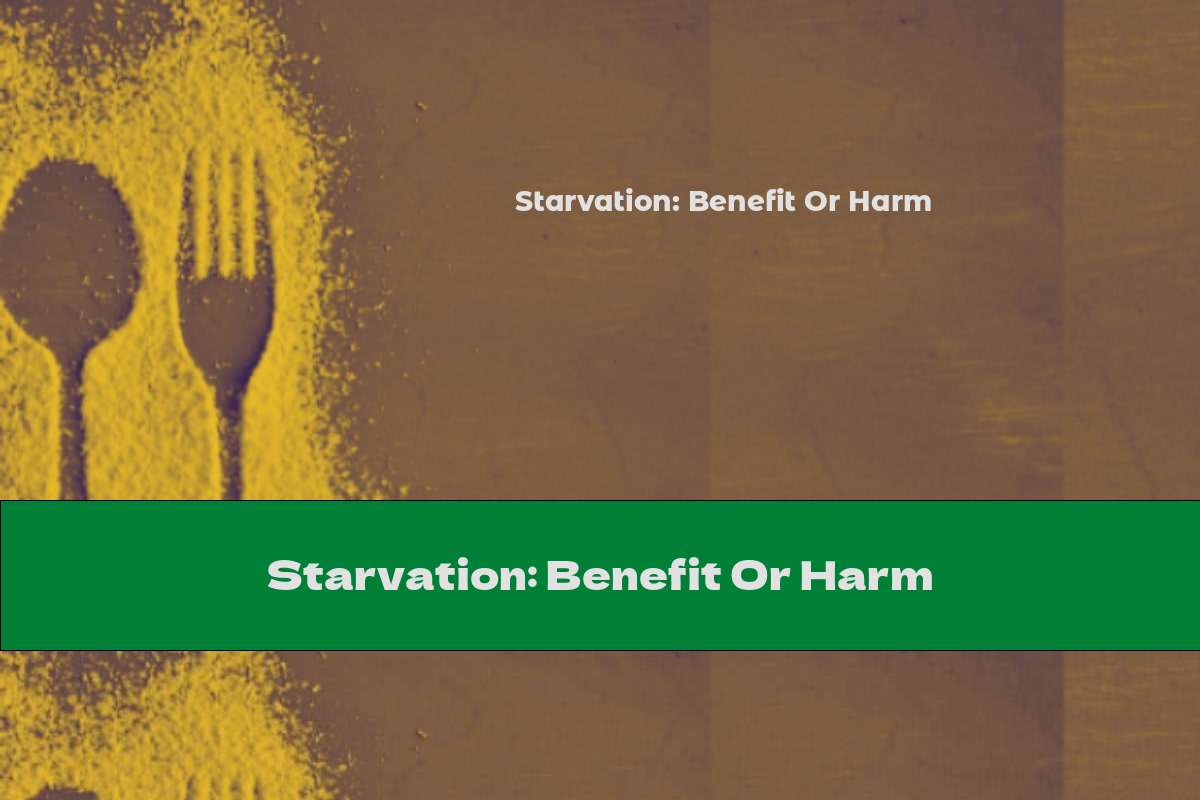Starvation: Benefit Or Harm
 Author: Dean Rouseberg
Time for reading: ~3
minutes
Last Updated:
February 16, 2026
Author: Dean Rouseberg
Time for reading: ~3
minutes
Last Updated:
February 16, 2026

Should we believe in the power of therapeutic fasting for better brain function and digestion?
Fasting gained great popularity as a result of the discovery of autophagy and biohacking by Nobel laureate Yoshinori Ohsumi. Now everyone thinks that intermittent fasting is a mandatory refusal to eat for a day or more during the week and a reduction in caloric intake. However, the practice of intermittent fasting is much broader. The benefits of reducing calories have been researched for a long time. For example, reducing the caloric content of food to 500-800 kcal per day for several months is considered by more and more specialists as an alternative to the traditional treatment of insulin resistance and type 2 diabetes. After normalization of metabolism, the caloric content of food can be gradually increased.
The essence of medical fasting is a sharp reduction (temporary reduction) of food consumption , which means energy from the outside. This process is also called calorie restriction.
Calorie restriction leads to an increase in telomerase activity and, accordingly, an increase in the length of telomeres, and also enhances the phenomenon of cellular autophagy. Both factors prevent aging processes and are biological mechanisms that work against oncological and neurodegenerative diseases. High telomerase activity is associated with longer life span.
Thanks to the active formation of brain neurotrophic factor (BDNF), which occurs during starvation , starting the process of recovery and the appearance of new nerve cells. The peak of its active formation is observed with a low-calorie diet and sports activities and significantly decreases with overeating.
Some quite reasonably adhere to fasting in order to improve mental activity and creative processes. Fat reserves are broken down during fasting . During this process, about 9 kcal per 1 g of fat is released, and with sufficient liquid consumption, you do not feel hungry, but on the contrary, you feel a surge of strength and increased performance. This is the basis of the principle of ketone fuel - a drink that was developed to improve endurance in the USA (only $99 for 100 ml!). In addition, during fasting , the hunger hormone ghrelin is released. It is known that this substance promotes the regeneration of nerve cells that participate in memory processes.
How to determine how often and how long you need to fast
Nowadays, there are various methods of applying calorie restriction in practice. Fasting lasting no more than 3 days helps to cleanse the body and start the detoxification process.
The 16:8 scheme is widespread, there are those who can withstand fasting for 24 hours and even 36. It is necessary to prepare for the fasting process : limit the diet to 1500 kcal per day, go to bed without dinner several times a week and have breakfast no earlier than 12 o'clock in the afternoon. After that, you can increase the interval between meals to 24 hours. At the same time, clean water should be consumed, since there is no question of giving up liquid.
How to prepare for starvation
-
Consult a doctor before starting fasting . Go through all the necessary tests to rule out a substance deficiency and avoid a possible problem.
-
Replace caffeinated drinks in your diet, give up cigarettes - this will prevent the feeling of hunger.
-
Do not forget the importance of 7 hours of sleep, go to bed no later than 11:00 p.m.
-
Avoid excessive physical activity.
Although intermittent fasting is promoted as a way of life, it should not be idealized. It is better to take breaks for 12-24 hours within 2-3 weeks, and to spend 36-hour fasting only once during the week and gradually return to a balanced diet. If you want to radically reduce your calorie intake, remember that it takes 2 weeks to prepare and 3 weeks to recover from this state.
Related Articles
- The Power of Honeysuckle: Health Benefits and Recipes
- Fruitskewers in Honey Syrup: Nutritional Benefits and Recipes
- The Ultimate Guide to Buffer 500 in Nutrition: Benefits and Usage
- Nutritional Benefits of Fruit Skewers in Honey Syrup: A Delicious and Healthy Recipe
- Nutrition Guide: Fruitskewers in Honey Syrup - Benefits, Recipes, and More
Top Nutrition Articles Today
- . E481: Uses, Benefits, Side Effects, and Safety Regulations
- . Granadilla - Health Benefits
- . Nutrition Trends 2026: Diet Plans, Recipes, and Wellness Tip...
- . The Benefits of Myra E: A Powerful Vitamin E Supplement
- . First Complementary Foods: What And When To Give A Child (wi...
- . The Power of Nori: Health Benefits and Nutritional Value
- . Nutrition Trends for 2026: Superfoods, Recipes, and Balanced...
- . The Nutritional Benefits of Quaker Oats: A Complete Guide
- . The Role of Micronutrients in Chicken: A Comprehensive Guide
- . Carbs to Sugar Conversion Chart: Monitoring Carb and Sugar I...